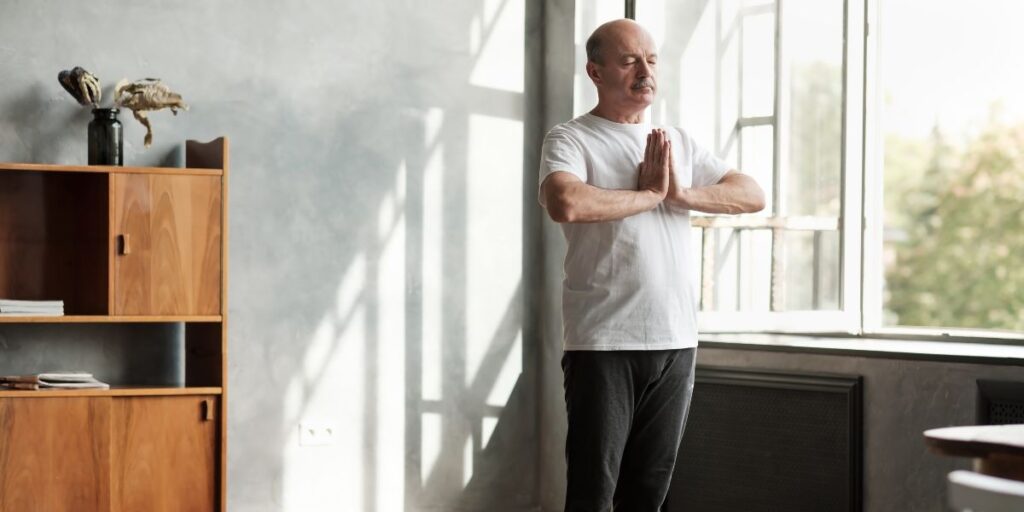Self-Care in Recovery

Self-care in recovery isn’t just about fun treats like spa days or shopping. Self-care is mainly about meeting basic needs like eating well, drinking enough water, sleeping well, and following your medicine schedule.
Looking after yourself well is crucial for keeping sober. It reduces stress and avoids things that might make you return to bad habits. Those who practice self-care in recovery usually have an easier time with their substance use disorder and stay sober for longer. They also often create stronger and more supportive connections with others once they learn how to take better care of themselves.
What Is Self-Care?
Taking care of yourself means knowing yourself, making smart choices, and being strong and independent. The National Institute of Mental Health (NIMH) reports that self-care helps people stay happy and healthy.
Self-care means creating and sticking to good habits for your health, thoughts, emotions, and daily life. When you’re healthy in body, mind, and heart, it’s easier to manage stress, handle difficult emotions, and life’s problems without using drugs or alcohol.
Why Is Self-Care Important?
Looking after yourself is important, especially for those recovering from drug or alcohol issues. Ignoring something, like not getting enough sleep, can create problems in other areas. You might feel lonely or sad if you’re too tired to work out or see friends. These feelings can get stronger and could lead to using drugs or alcohol once more.
As you continue to take care of yourself, it becomes more natural. You begin to feel better, grow personally, and maintain happiness and health for a long time.
Types of Self-Care
Self-care comes in many forms, like taking care of your mind, body, feelings, everyday tasks, and planning. It’s different for each person and touches all parts of life.
Sometimes, a certain type of self-care becomes more important because of life events. Knowing your needs and how to fulfill them is vital for overcoming active addiction and properly caring for yourself.
Physical Health
Physical self-care involves eating well, working out often, sleeping enough, and drinking plenty of water. These habits keeps your energy high and makes you feel good all day. When you’re not feeling sick or very tired, you can pay attention to other parts of taking care of yourself.
Mental Health
Staying busy and interested can help you stay in control and prevent negative thoughts or feelings from becoming overwhelming. Getting treatment for mental health issues is also important in maintaining control and preventing overwhelming emotions. Programs and therapies can give you skills to handle mental health problems in ways that support your healing and make you feel more confident.
Emotional Health
While physical and mental health are important, understanding your feelings, why you feel that way, and how to handle them properly is crucial for keeping a healthy mind. This might mean you have to set limits with people who make you tired or think about using drugs or alcohol.
Emotional health is also about doing things that make you happy and proud, like reaching goals or trying new hobbies.
Practical and Logistical Health
Getting ready for both the things you know will happen and the surprises can lower stress and worry about what’s coming. Doing regular health checks, going to support groups or group therapy, and connecting with other people like friends all help with self-care and staying better in the long-term.

What Does HALT Mean?
Addiction experts made a simple way to check on your self-care needs called HALT. It means you should stop and think about what you need if you’re hungry, angry, lonely, or tired.
Hungry
Feeling hungry can make you cranky, tired, and unable to focus. Sometimes, all you need is a snack, especially if you skipped lunch or haven’t eaten right lately. Listening to your body and having healthy food can improve your mood and boost your energy.
Angry
Feeling angry is normal, but some people handle it in bad ways, like using drugs or alcohol. Using good ways to understand and deal with your anger, or staying away from what or who makes you angry, is a way to take care of yourself.
Lonely
When you’re getting better from addiction, it can be lonely. Talking to people is important to feel like you belong and are supported. Talking to a friend or family who helps you, going to a support group, or calling someone who guides you in recovery are all good ways to care for your feelings and stop feeling so alone.
Tired
Being tired, physically or mentally, can affect your thoughts, feelings, and the way you view things and people. Taking a nap in the morning can help you feel more awake and relaxed. Good sleep requires a consistent routine. It takes a few days to establish.
Showing your friends and family about HALT can be good. Sometimes, we don’t see things clearly about ourselves, so having someone who supports your recovery can help remind you to take care of yourself.

Self-Care Practices
Getting better takes a long time, not just a short while. Small, steady steps lead to big, good changes. You can begin self-care with easy things, a few at a time, and make them into a routine. Some self-care is about everyday things, some for fun, but what’s important is they’re healthy and make you feel good.
Self-care practices include daily activities like:
- Daily washing and grooming
- Preparing meals ahead
- Exercising often
- Going to support groups
- Seeing doctors and therapists as planned
- Spending a little time each day on meditation and being thankful
- Joining fun classes
- Keeping your home tidy
- Eating lunch with a friend
- Visiting new places
- Enjoying the outdoors
- Appreciating the present moment
- Practicing a form of spirituality self-care
These self-care ideas are just a start. Begin your self-discovery journey now! Cultivate inner peace with kindness and patience. You deserve self-love and happiness.
Self-Care in Addiction Recovery
At Northridge Addiction Treatment Center, we are proud of our approach to treating addiction based on facts and tailored to each person for a lasting recovery. Our live-in treatment place offers a secure, cozy, and helpful setting to detox with round-the-clock medical care safely, and we teach you how to live without using substances.
Our caring and certified team at Northridge Addiction Treatment Center knows that drug abuse can make even simple self-care feel not worth it. We’re here to help you beat bad thoughts and feelings and teach you new thinking skills for a strong and long-lasting recovery.
Our treatment specialists are ready to assist you in beginning a life focused on recovery. Reach out now.
Find Meaningful Recovery
Our caring and compassionate specialists are eager to help you comfortably navigate this journey to recovery. Our individualized treatment plan, programs, and therapies may be a perfect match for you or your loved one. Let us assist you in living the happy life you deserve. It starts with a phone call.




